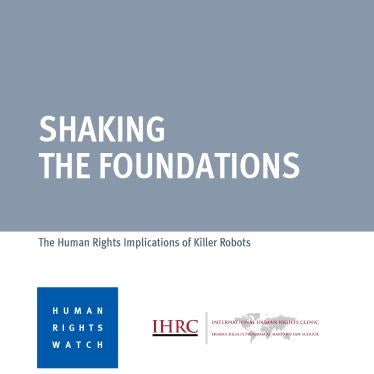President Barack Obama
The White House
1600 Pennsylvania Avenue, NW
Washington, DC 20500
Re: Mine Ban Treaty
Dear President Obama,
We are writing to urge you to review US policy toward banning antipersonnel landmines and to commit the US to joining the 1997 Mine Ban Treaty. Human Rights Watch has worked on this issue for more than two decades and is a founding member of the International Campaign to Ban Landmines (ICBL), 1997 Nobel Peace Prize Laureate.
For your consideration, we would like to discuss some of the issues that featured in past policy debates on antipersonnel mines. Both in 1997, under President Clinton, and in 2004, when the Bush administration did its policy review, the Pentagon said that it needed to continue using both self-destructing (non-persistent, or "smart") antipersonnel mines and non-self destructing (persistent, or "dumb") antipersonnel mines in Korea, and to use non-persistent mines elsewhere in the world.
The US has kept 1.1 million non-self-destructing antipersonnel mines (M14 and M16) to use in future conflict in Korea. These mines have sometimes been portrayed as necessary to stop a sudden attack from the North; yet according to official US military sources, half of the mines are not stored in Korea, but in the continental US, and are of no use in the case of a sudden attack. Moreover, the 2004 policy review decided that, after 2010, the US would no longer use non-self-destructing mines in Korea. So, with respect to non-self-destructing antipersonnel mines, the defense of Korea is not a rationale for not signing the Mine Ban Treaty.
Self-destructing mines are dropped from aircraft or shot out of artillery and rockets over long distances. The Pentagon has claimed that these mines do not pose humanitarian dangers. While they may be less dangerous than non-self-destructing mines, these mines are by no means safe for civilians. Scattered over a vast area, often thousands at a time, self-destructing mines cannot be targeted to avoid civilian casualties. Their self-destruct mechanisms have an estimated failure rate of 1 to 10 percent, and large numbers of dangerous explosive duds from US scatterable mines were found in Kuwait and Iraq months and even years after they were used in 1991. The negotiators of the Mine Ban Treaty, including the closest US allies, were not swayed by US arguments that self-destructing mines do not pose unacceptable dangers.
The simple fact that the US did not use antipersonnel mines of any kind in Bosnia, Kosovo, Afghanistan, Iraq, or any other location for the past 18 years, during both high and low intensity conflict, shows that the weapon has little or no military value to US forces today.
However, the political costs of the US using antipersonnel mines today would be very high. If the US used mines during a joint operation with any State Party to the Mine Ban Treaty, that country would be at great risk of being put in violation of the treaty, which prohibits any assistance with the use of mines.
The US has not procured any antipersonnel mines in a dozen years, and has no plans to in the future, again indicating their lack of value. Many of these mines are likely approaching the expiration of their shelf-life and must be destroyed. The US has had an export ban in place since 1992. It is the world's largest contributor to global mine clearance and victim assistance programs. Simply put, the US is already compliant with the key provisions of the Mine Ban Treaty, and relinquishing antipersonnel mines should not be a challenge.
It is also worth noting that while the treaty prohibits the use, production, transfer, and stockpiling of all antipersonnel mines, it does not prohibit the use of command-detonated (man-in-the-loop) devices such as Claymore directional fragmentation munitions, or the new "Spider" system developed as an alternative to landmines.
We understand that the US has registered to attend the Second Review Conference of the 1997 Mine Ban Treaty, which opens in Cartagena, Colombia on November 29, 2009. We welcome US participation in this high-level event, also known as the "Cartagena Summit on a Mine-Free World." This marks the first time that the US has been represented at a formal meeting of the treaty.
We believe US participation in the Cartagena Summit is a positive step in the right direction, but urge the US to express in Cartagena its sincere commitment to relinquish this weapon and join the Mine Ban Treaty.
Sincerely,
Stephen D. Goose
Director, Arms Division






